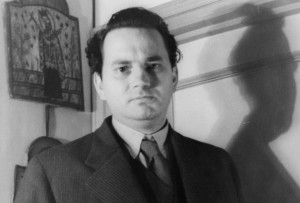Do people in North Carolina remember Thomas Wolfe, their once famous son, author of Look Homeward, Angel, whose books helped many of us get through the transformation from childhood to adulthood and opened the door to an appreciation of fine writing?
Do his words still inspire new writers to open their mental guts and spill out their words and stories?
 For answers to those questions, I decided to play a “Where’s Waldo?” type game and look for Wolfe in recent North Carolina-related books to see if I could find any evidence of his continuing influence.
For answers to those questions, I decided to play a “Where’s Waldo?” type game and look for Wolfe in recent North Carolina-related books to see if I could find any evidence of his continuing influence.
In What I Came to Tell You by Asheville’s Tommy Hays, according to one reader, Thomas Wolfe’s spirit “hangs over the novel like a shimmering mist.” A young boy named Grover is the lead character. His father is director of Asheville’s Thomas Wolfe house, where much of the action takes place. The father named his son after Eugene Gant’s younger brother and his sister after Sudie, both characters in Look Homeward, Angel. The action begins in Riverside Cemetery, where Wolfe is buried and Hays’ characters visit their mother’s grave.
Lee Smith’s Guests on Earth is set in Asheville, so it is easy for her to have her main characters visit Wolfe’s “mother’s boardinghouse downtown” and his grave at Riverside.
The title of Wiley Cash’s debut novel, A Land More Kind than Home, is a tribute to Wolfe.
Here is the complete quotation from Wolfe’s You Can’t Go Home Again:
“Something has spoken to me in the night, and told me that I shall die, I know not where. Saying: ‘To lose the earth you know, for greater knowing; to lose the life you have, for greater life; to leave the friends you loved, for greater loving; to find a land more kind than home, more large than earth.’”
Pat Conroy’s new memoir, The Death of Santini, renews his longstanding gratitude for Wolfe’s influence on his writing. He once wrote, “My writing career began the instant I finished Look Homeward, Angel. Thomas Wolfe taught me that the great books change you immediately and forever.”
Lookaway, Lookaway, Wilton Barnhardt’s inside fictional look at Charlotte, has been compared to Wolfe’s treatment of Asheville. Barnhardt has one of his characters mention Wolfe as “a manic-depressive and drinker.”
In his award-winning first novel, A Short Time to Stay Here, Terry Roberts describes an Asheville boarding house “with its pinched, puritanical proprietor, a woman named Wolfe.”
Ron Rash, in The Cove, writes that “an old man, tall and gaunt, stooped through the open doorway, his hands and leather apron smudged with white dust. ‘W.O Wolfe, at your service,’ the stonecutter said, and made a slight bow. ‘How may I assist?’”
In “Return Trip,” a story in Elizabeth Spencer’s upcoming book Starting Over, Wolfe’s ghost plays a role as one of the story’s characters insists on visiting the fire-damaged memorial at Wolfe’s mother’s “The Old Kentucky Home” boarding house.
“‘It is for my soul,’ he explained. ‘I’ve got to live again. Every little bit helps… Didn’t Wolfe have an awful family? I wonder how he stood it… Think of all Wolfe’s talent in that one house. Busting to get out. And it did.’”
As her characters drive away from the memorial, Spencer writes, “Gray, old-fashioned, rambling and unsavory, the old house had still managed to assert itself. The long-ago meetings, quarrels, seductions and heartaches of that big lumbering man’s life, the family’s torments, had all smoked up right out of the windows and porches to sit on the backseat of the car, leaning awkwardly over, speaking in their ears.”
Where is Waldo – I mean, Where is Wolfe?
Everywhere I looked.

